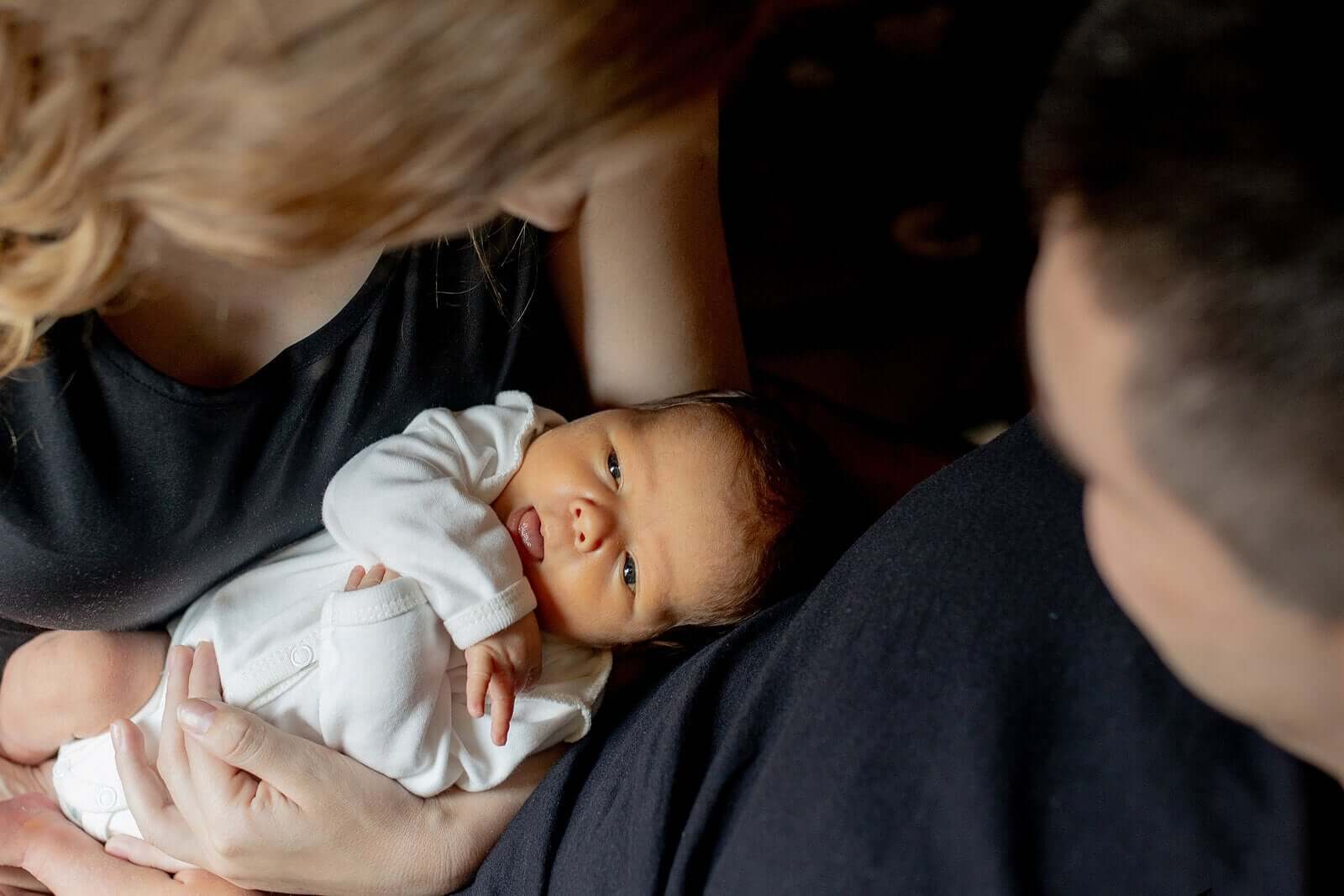Fourth Trimester of Pregnancy: Why Is It Important?


Written and verified by the psychologist Elena Sanz Martín
We’re all aware that human pregnancy is divided into three trimesters. During these stages, the baby grows and develops inside the mother’s uterus. But, what if pregnancy doesn’t finish after the baby is born? What if the baby’s first months of life were as important as the three stages of prenatal development? In fact, this is what the theory of the fourth trimester of pregnancy suggests.
When babies come into the world, we tend to believe that they’re ready to face their lives. Then, many parents feel frustrated when dealing with the baby’s complaints, pains or complications that may come up.
Parents ask themselves what they’re doing wrong or what happens with their babies. However, if they realize how difficult adaptation may be for the baby, it’ll be easier to understand the situation and keep calm.

What’s the fourth trimester of pregnancy?
Harvey Karp, American pediatrician, developed the theory of the fourth trimester. It suggests that human babies come into the world prepared to survive, but they can’t do it without the help of their caregivers. Therefore, they’ll need several months of exterogestation (external womb) to continue developing their abilities.
To understand this, you should look into similar situations in nature. For example, most mammals are able to stand and even walk or run, once they’re born.
Whereas human beings depend on their caregivers for a longer period of time. Hence, the theory of the fourth trimester states that all babies, even the ones who are born after a full-term pregnancy, are born premature in many aspects.
To fully develop their nervous system, fetuses should stay longer inside their mother’s womb. However, it could complicate the moment of birth, because the baby would have a bigger head. As a result, the first months of life should be considered another stage of pregnancy.
A difficult transition
During the first months, babies usually present symptoms of anxiety, cramps and sleeping problems.
This is far from being related to a disease or irregularity. In fact, it’s absolutely normal. Remember that at this stage, they’re in a completely different environment, compared to their mother’s womb:
- Inside the womb, temperature is around 98 ºF. Outside, temperature changes and sometimes, it’s quite extreme.
- Before they’re born, they don’t receive too much stimulation (smells, lights, loud noises). Outside the womb, they face unknown and overwhelming stimuli all the time.
- During pregnancy, mothers are their babies’ homes, food providers and only company. Thus, they never feel hungry, thirsty or annoyed. Once they’re born, all these new unpleasant feelings start appearing and the baby doesn’t know how to handle them.
- And, above all, babies were in permanent contact with their mothers. Once they come into the world, they experience loneliness, separation and fear. They can’t feel their mothers all the time, and they need them.

How should you address the fourth trimester of pregnancy?
Taking into account all the information given in this article, you should experience the fourth trimester as a continuation of the pregnancy. So, babies don’t have to adapt to the world that surrounds them. Instead, they should be in more or less the same conditions as they were inside their mother’s womb.
To do this, you should provide your baby with skin-to-skin contact and food every time the baby demands it. Plus, you should try to avoid overstimulation. Hold them in your arms as much as you can, sing to them and rock them. This will give them the comfort and sense of security they lost when they were born.
In conclusion, your baby isn’t inside your womb anymore, but they need you as if they were. Don’t spoil them, because if you help them transition properly, their psychological and emotional development will be better.
We’re all aware that human pregnancy is divided into three trimesters. During these stages, the baby grows and develops inside the mother’s uterus. But, what if pregnancy doesn’t finish after the baby is born? What if the baby’s first months of life were as important as the three stages of prenatal development? In fact, this is what the theory of the fourth trimester of pregnancy suggests.
When babies come into the world, we tend to believe that they’re ready to face their lives. Then, many parents feel frustrated when dealing with the baby’s complaints, pains or complications that may come up.
Parents ask themselves what they’re doing wrong or what happens with their babies. However, if they realize how difficult adaptation may be for the baby, it’ll be easier to understand the situation and keep calm.

What’s the fourth trimester of pregnancy?
Harvey Karp, American pediatrician, developed the theory of the fourth trimester. It suggests that human babies come into the world prepared to survive, but they can’t do it without the help of their caregivers. Therefore, they’ll need several months of exterogestation (external womb) to continue developing their abilities.
To understand this, you should look into similar situations in nature. For example, most mammals are able to stand and even walk or run, once they’re born.
Whereas human beings depend on their caregivers for a longer period of time. Hence, the theory of the fourth trimester states that all babies, even the ones who are born after a full-term pregnancy, are born premature in many aspects.
To fully develop their nervous system, fetuses should stay longer inside their mother’s womb. However, it could complicate the moment of birth, because the baby would have a bigger head. As a result, the first months of life should be considered another stage of pregnancy.
A difficult transition
During the first months, babies usually present symptoms of anxiety, cramps and sleeping problems.
This is far from being related to a disease or irregularity. In fact, it’s absolutely normal. Remember that at this stage, they’re in a completely different environment, compared to their mother’s womb:
- Inside the womb, temperature is around 98 ºF. Outside, temperature changes and sometimes, it’s quite extreme.
- Before they’re born, they don’t receive too much stimulation (smells, lights, loud noises). Outside the womb, they face unknown and overwhelming stimuli all the time.
- During pregnancy, mothers are their babies’ homes, food providers and only company. Thus, they never feel hungry, thirsty or annoyed. Once they’re born, all these new unpleasant feelings start appearing and the baby doesn’t know how to handle them.
- And, above all, babies were in permanent contact with their mothers. Once they come into the world, they experience loneliness, separation and fear. They can’t feel their mothers all the time, and they need them.

How should you address the fourth trimester of pregnancy?
Taking into account all the information given in this article, you should experience the fourth trimester as a continuation of the pregnancy. So, babies don’t have to adapt to the world that surrounds them. Instead, they should be in more or less the same conditions as they were inside their mother’s womb.
To do this, you should provide your baby with skin-to-skin contact and food every time the baby demands it. Plus, you should try to avoid overstimulation. Hold them in your arms as much as you can, sing to them and rock them. This will give them the comfort and sense of security they lost when they were born.
In conclusion, your baby isn’t inside your womb anymore, but they need you as if they were. Don’t spoil them, because if you help them transition properly, their psychological and emotional development will be better.
All cited sources were thoroughly reviewed by our team to ensure their quality, reliability, currency, and validity. The bibliography of this article was considered reliable and of academic or scientific accuracy.
- Karp, H. (2015). The Happiest Baby on the Block; Fully Revised and Updated Second Edition: The New Way to Calm Crying and Help Your Newborn Baby Sleep Longer. Bantam.
- Karp, H. (2004). The “fourth trimester”. Contemporary Pediatrics, 21(2), 94-104. https://www.drdefranca.com/the-fourth-trimester-and-colic.html
This text is provided for informational purposes only and does not replace consultation with a professional. If in doubt, consult your specialist.








